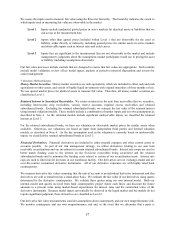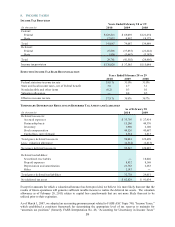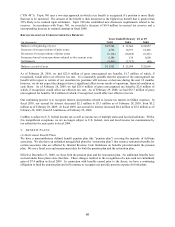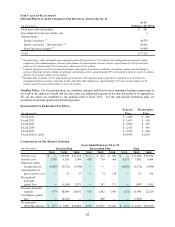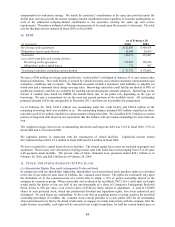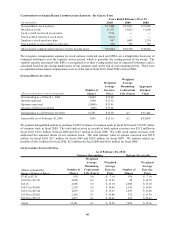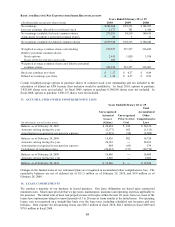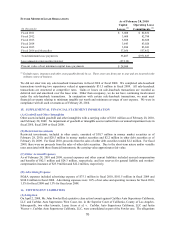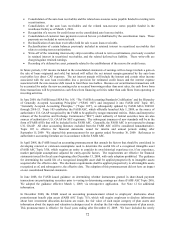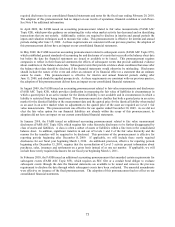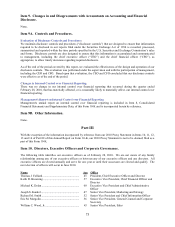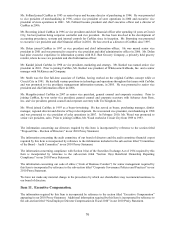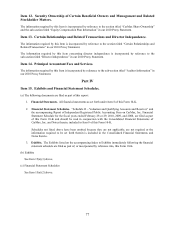CarMax 2010 Annual Report Download - page 77
Download and view the complete annual report
Please find page 77 of the 2010 CarMax annual report below. You can navigate through the pages in the report by either clicking on the pages listed below, or by using the keyword search tool below to find specific information within the annual report.
67
For all stock options granted prior to March 1, 2006, the fair value was estimated as of the date of grant using a
Black-Scholes option-pricing model. For stock options granted to associates on or after March 1, 2006, the fair
value of each award is estimated as of the date of grant using a binomial valuation model. In computing the value of
the option, the binomial model considers characteristics of fair-value option pricing that are not available for
consideration under the Black-Scholes model, such as contractual term of the option, the probability that the option
will be exercised prior to the end of its contractual life and the probability of termination or retirement of the option
holder. For this reason, we believe that the binomial model provides a fair value that is more representative of
actual experience and future expected experience than the value calculated using the Black-Scholes model. For
grants to nonemployee directors prior to fiscal 2009, we used the Black-Scholes model to estimate the fair value of
stock option awards. Beginning in fiscal 2009, we used the binomial model. Estimates of fair value are not
intended to predict actual future events or the value ultimately realized by the recipients of share-based awards.
The weighted average fair values at the date of grant for options granted were $5.30 per share in fiscal 2010, $7.16
per share in fiscal 2009 and $8.43 per share in fiscal 2008. The unrecognized compensation costs related to
nonvested options totaled $19.9 million as of February 28, 2010. These costs are expected to be recognized over a
weighted average period of 2.3 years.
ASSUMPTIONS USED TO ESTIMATE OPTION VALUES
2010 2009 2008
Dividend yield10.0% 0.0% 0.0%
Expected volatility factor (1) 52.2%-73.4% 34.8%-60.9% 28.0%-54.0%
Weighted average expected volatility157.3% 44.1% 38.5%
Risk-free interes t rate (2) 0.2%-3.2% 1.5%-3.7% 4.3%-5.0%
Expected term (in years) (3) 5.2-5.5 4.8-5.2 4.2-4.4
Ye ar s Ende d Fe bruar y 2 8 or 2 9
(1) Measured using historical daily price changes of our stock for a period corresponding to the term of the option and the
implied volatility derived from the market prices of traded options on our stock.
(2) Based on the U.S. Treasury yield curve in effect at the time of grant.
(3) Represents the estimated number of years that options will be outstanding prior to exercise.
RESTRICTED STOCK ACTIVITY
(Shares in thousands)
Outs tanding as of M arch 1, 2009 2,633 20.55$
Restricted stock granted ― ―$
Res tricted s tock vested (819) 17.25$
Restricted stock cancelled (151) 21.65$
Outs tanding as of February 28, 2010 1,663 22.08$
Weighted
Average
Grant Date
Fair Value
Number of
Shares
We granted no shares of restricted stock to our employees in fiscal 2010 and 1,078,580 shares in fiscal 2009. The
fair value of a restricted stock award is determined and fixed based on the fair market value of our stock on the grant
date.
We realized related tax benefits of $4.1 million from the vesting of restricted stock in fiscal 2010. The realized tax
benefits in fiscal 2009 and in fiscal 2008 were immaterial. The unrecognized compensation costs related to
nonvested restricted stock awards totaled $6.6 million as of February 28, 2010. These costs are expected to be
recognized over a weighted average period of 0.7 years.


